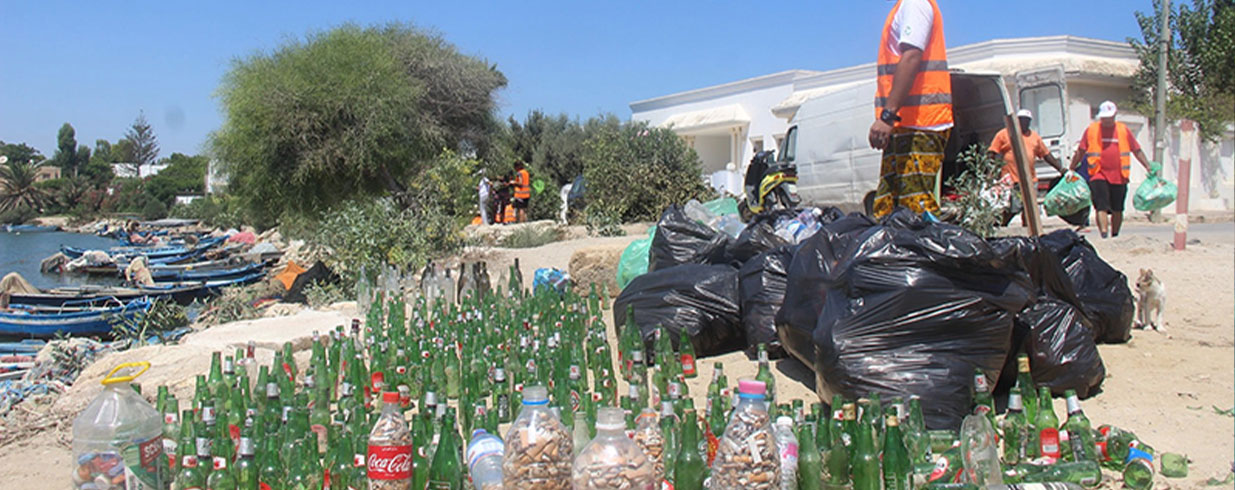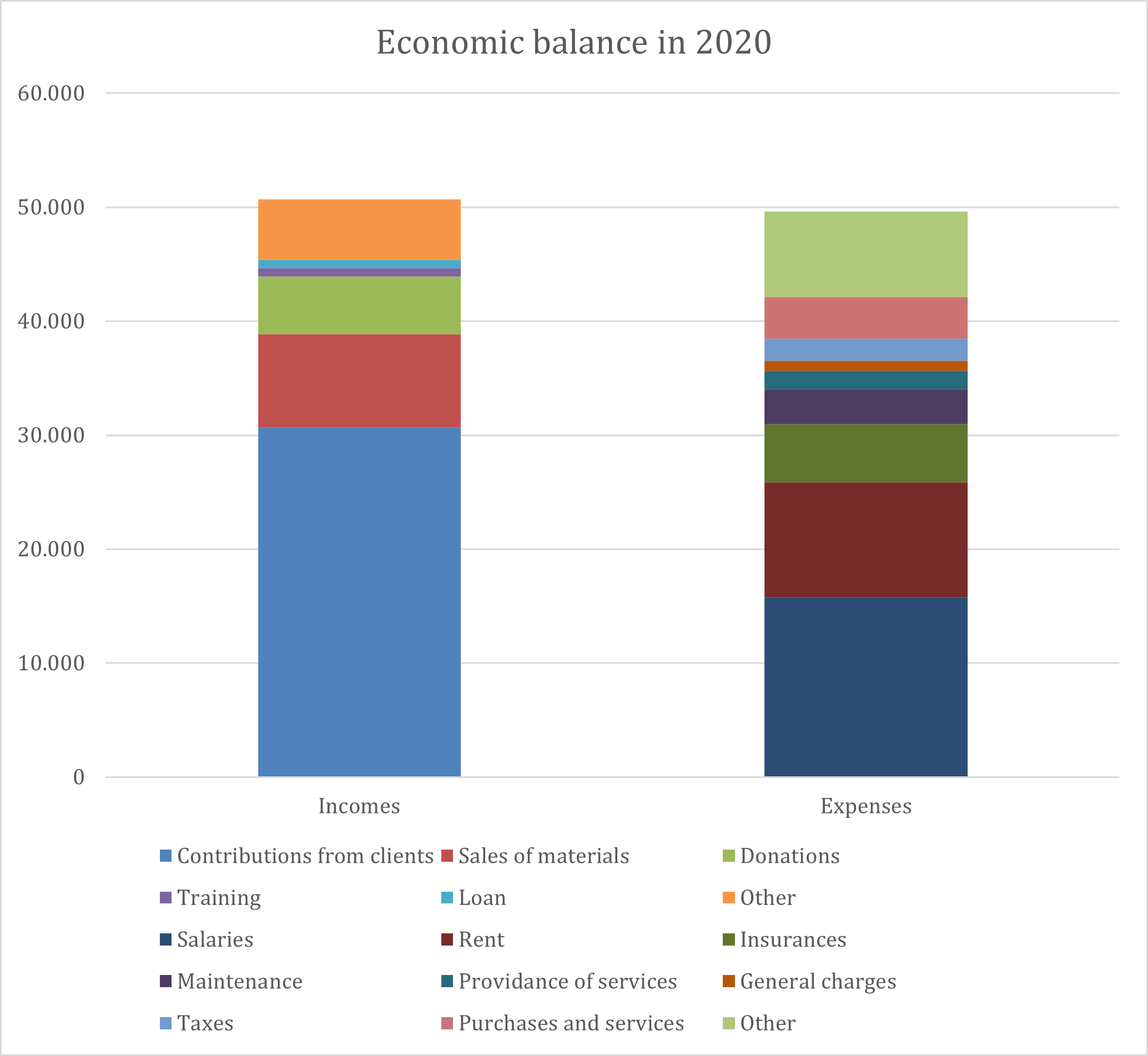A waste collection service for citizens run by an NGO (Tunisie Recyclage) to promote source-separation.

Tunisie Recyclage, a selective collection service developed by a local NGO
EXPECTED OBJECTIVES
The main objectives of Tunisie Recyclage are:
• Raising citizens awareness
• Introducing source-separation of waste
• Reducing landfilling of packaging waste
BACKGROUND INFORMATION AND LOCATION
General information on waste management (Tunisia):
• Municipal waste quantities: 2.6 million tonnes per year
• Packaging waste collected quantities: 55,000 tonnes per year
• Composition of municipal waste: organic waste (63%), plastic (9.4%), textiles (8.7%), paper/carton (8.6%), metal (1.6%), glass (1.1%).
Based on the composition of waste in Tunisia we notice that the humid fraction is very high and exceeds 63%. The humidity rate can cause a real problem in the waste management systems where sorting at source is non-existent. A waste sorting process at source is needed to reduce the high costs generated by the treatment of leachate.
General information on the territory:
• Location: Gammarth village and Gammarth Superieur
• Country: Tunisia
• Population: 116, 000 people
• Density: 77.4 per km2
The areas covered by the action for the waste collection are: Gammarth Village, Gammarth Superieur, La Marsa, Sidi Bou Said, Carthage, the gardens of Carthage, the Kram, a small part of the Soukra and the Berges du Lac.
IMPLEMENTING BODIES
• Ministry of Environment and Sustainable Development
• Local authorities of Tunis (including municipalities of Gammarth, La Marsa and Sidi Bous Said)
KEY STAKEHOLDERS INVOLVED
Donors:
• Delegation of the European Union to Tunisia
• Embassy of Canada
• Embassy of Australia
• Embassy of Poland
• Henirich Boll Foundation
• Delice company
• Danone Company
• Sfbt Company
• Carrefour Company
Stakeholders involved in source separation of waste:
• Local NGOs
• Citizens
GENERAL CONTEXT
Tunisia faces many challenges among which high urbanization with increased pressure on ecosystems and overexploitation of natural resources. In order to face this problem, Tunisia has gradually established a policy of environmental protection that has evolved into a policy of promoting sustainable development.
When it comes to solid waste management, the collection of recyclable materials is done by small companies, approved and authorized by the National Agency for Waste Management (ANGeD). These authorised private waste collection operators buy the collected materials from the informal collectors (Barbechas) and pay them directly after weighing.
DESCRIPTION OF THE ACTIVITIES
The NGO’s activity started as an awareness raising action organised in 2012. The objective was to assess if the citizens of an area would be interested in separation of their waste at source and if they would be willing to participate in a ‘collection on demand’ scheme.
The current activity of Tunisie Recyclage consists of a system or service of collection of separated solid waste from registered citizens, businesses and institutions in the area (as mentioned above):
• The citizens/businesses, etc. contact the NGO, communicate their contact details (name, address, telephone number and email);
• They register and pay an annual fee for the NGO service and receive bags to separate their waste;
• A flyer produced by the NGO guides them on how to properly separate their waste;
• They contact the NGO to collect their separated waste;
• The NGO does a second sorting at the dedicated sorting site; and
• Puts the sorted waste on sale to recycling companies.
Tunisie Recyclage also does other activities to sensitise the public such as beach and seabed clean-up campaigns, in partnership with foundations, embassies, etc.
FINANCING AND COST RECOVERY CONTEXT
The funding of the collection system is based essentially on:
• the annual contributions of citizens, companies and institutions (benefiting from the NGO’s waste collection service): households are required to pay TND 50 each year, while companies and institutions have to pay a fixed fee depending on the number of employees;
• the sale of the sorted waste
• donations
In terms of cost recovery, the cost of the activity exceeds the income, which presents a major challenge for the NGO. The annual fees (tax deductible), cover only part of the fixed expenses of the NGO (salaries, rent, insurance) while the sale of sorted materials does not generate significant incomes (about TND 6,000 for 40 tonnes of sorted waste).
In 2020, incomes and expenses amounted to about TND 50,000, with the following distribution:

Figure 1: economic balance of Tunisie Recyclage in 2020 (source: Tunisie Recyclage)
MAIN ACHIEVEMENTS AND RESULTS
• More than 1,000 people registered in the collection programme;
• The purchase of a van (equipment) has been possible, to facilitate collection and expand the scope of action;
• A sorting site in Soukra municipality has been set up;
• 3 stable jobs have been created (one driver and two sorting operators);
• Environmental clubs have been established to support the awareness component.
Results in figures covering the period 2012-2018 in terms of preservation of natural resources:
• 193 tonnes of collected paper equivalent to 13,346 of trees saved;
• 58 tonnes of collected plastic equivalent to 46 tonnes of petroleum saved;
• 117 tonnes of collected glass equivalent to 77 tonnes of sand preserved;
• 2,7 tonnes of collected aluminium equivalent to almost 11 tonnes of bauxite saved.
KEY FACTORS OF SUCCESS
The success of this action relies on several factors, but parallel sensitisation and awareness raising actions on the importance of proper waste management are very important:
• Raising awareness among citizens through door-to-door campaigns/collection;
• Good communication brochures and other materials to encourage correct source separation of waste at home/establishments;
• Awareness raising in primary schools and in general, Educating on the 3Rs principle in schools;
• Creation of environmental clubs;
• Organisation of beach/sea clean-up campaigns.
BOTTLENECKS, LIMITATIONS AND CHALLENGES
The lack of financial and technical means remain the most important hurdle. A summary of the challenges, are:
• The activity is carried out mainly by volunteers, which presents an obstacle in terms of human resources, as only three permanent jobs are secured (one driver and two sorting operators).
• The number of registrations to the service defines the revenue of the activity (more registrations mean more income and expansion potential). This means that awareness and communication is a must.
• The activity requires additional contributions and donations in order to be viable. Therefore, there is a constant fund-raising effort that needs to be running in parallel to the activities.
LESSONS LEARNED AND REPLICABILITY
For a similar household waste sorting initiative to be replicated, the following should be taken into account:
• A strong awareness and communication component needs to be part and parcel with the collection system in order to secure enough registrations to make the financial viability and expansion as likely as possible.
• Volunteer recruitment should be part of the design since it is certain that adequate revenue will not be secured in the early stages.
• Innovative fund-raising for the additional funds that may be needed is required (human and technical resources).
REFERENCES, LINKS TO FURTHER INFORMATION
Key information
Topic: separate collection, recycling
Waste fraction: municipal waste, packaging waste
Target group: citizens
Instruments: infrastructure, communication
Date of the implementation
From 1 April 2001 to date
